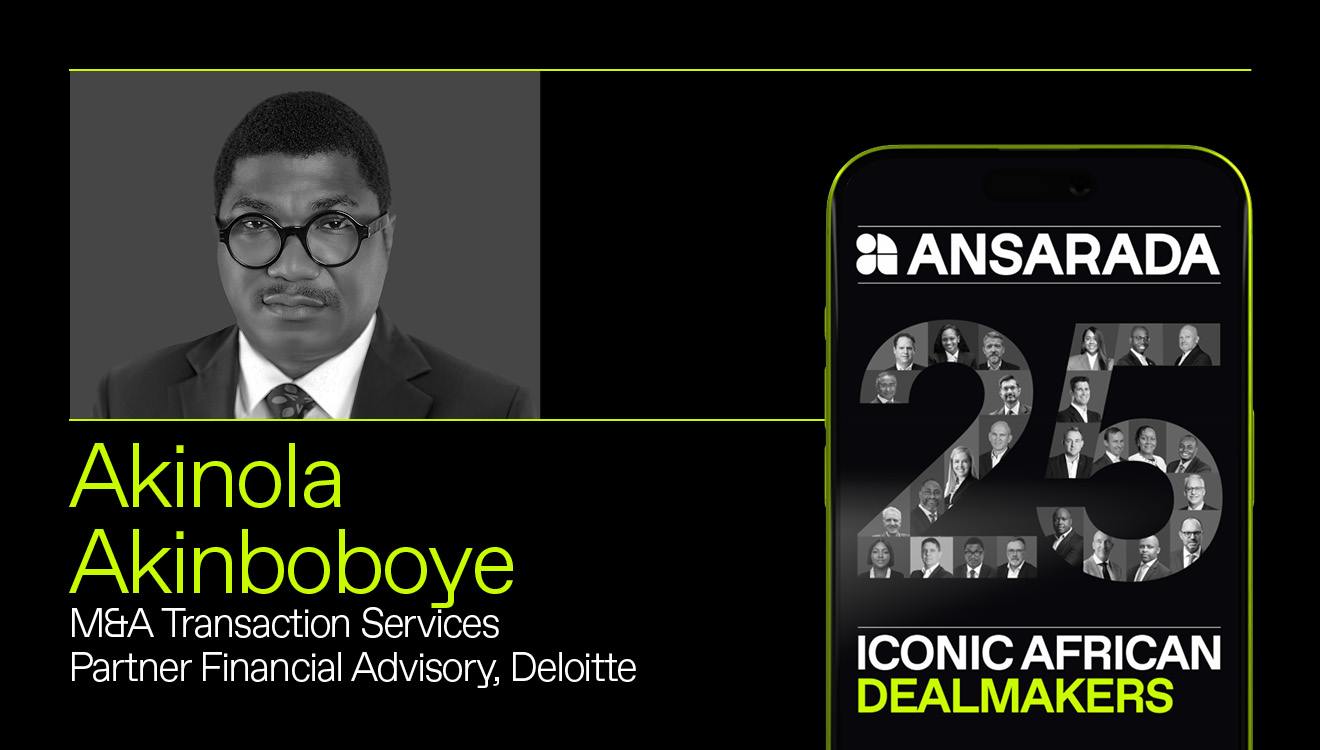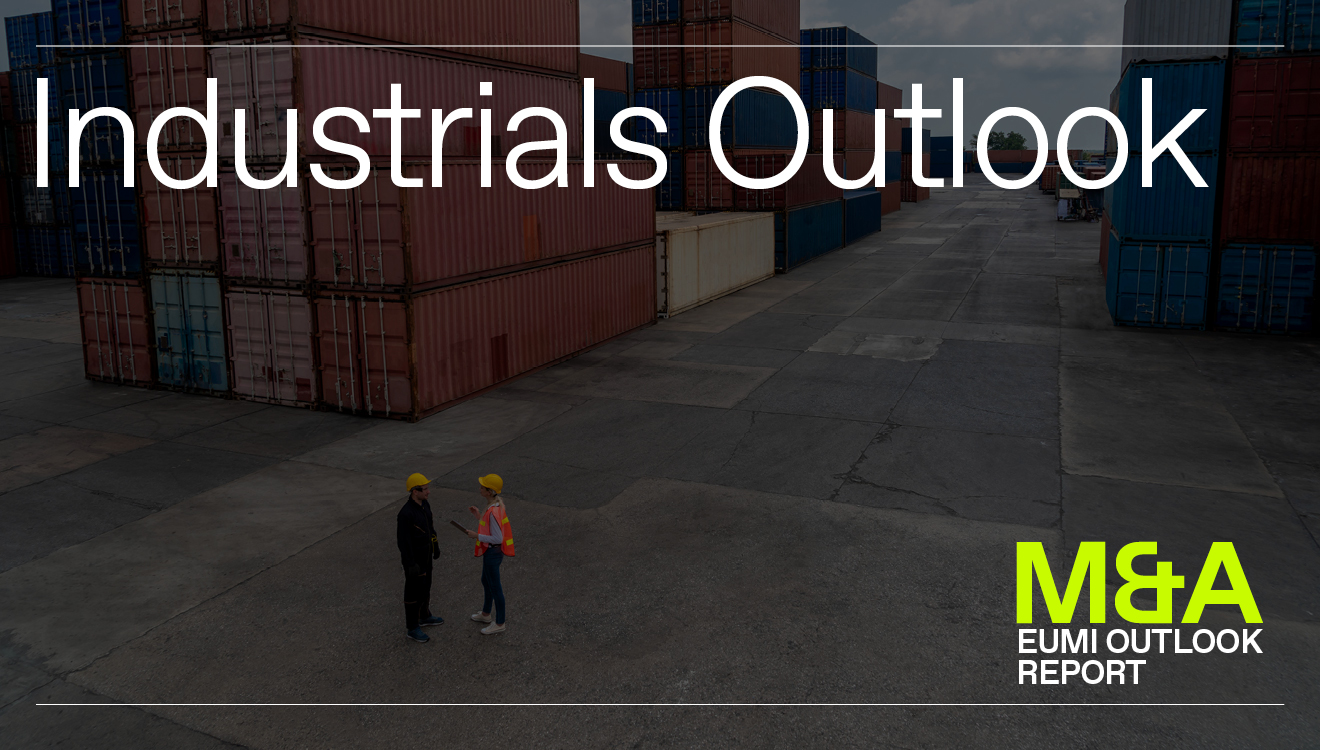Akinola Akinboboye on negotiation, nuance, and the future of deal-making in West Africa
Akinola Akinboboye, a Partner in Deloitte’s Financial Advisory division, leads the Transaction Services Team for West Africa. With over 14 years of experience, he specializes in financial advisory assignments, including pre-deal support, buy-side and sellside due diligence, SPA support, reporting accounting, and restructuring services.
By AnsaradaThu Apr 24 2025Mergers and acquisitions, Due diligence and dealmaking, Advisors

Akinola Akinboboye, a Partner in Deloitte’s Financial Advisory division, leads the Transaction Services Team for West Africa. With over 14 years of experience, he specializes in financial advisory assignments, including pre-deal support, buy-side and sellside due diligence, SPA support, reporting accounting, and restructuring services.
His expertise spans diverse sectors such as financial services (banking, pensions, and insurance), manufacturing, healthcare, real estate, agriculture, energy, consumer services, aviation, and telecommunications. Akinola has advised a wide range of clients, from listed companies and blue-chip firms to private equity investors and SMEs. This interview highlights his journey, key milestones, and his vision for the future of M&A in West Africa.
To start, could you share what initially inspired you to pursue a career in corporate finance and M&A?
I began my career as an auditor, where I gained insight into how businesses operate through their financial statements. When the opportunity arose to further my education, I realized that M&A was a field where I could make a significant impact. Companies grow either organically or through M&A, and I saw this as a way to contribute to economic growth. This realisation fueled my interest in M&A, and since then, no two days have been the same—I thoroughly enjoy the dynamic nature of this field.
Looking at your career journey, what core values or principles have guided you in navigating the complexities of deal-making in West Africa?
Successful deal-making requires a strong understanding of three key elements. First, it’s crucial to have a comprehensive understanding of the investment environment, as every market operates under unique conditions. Second, clarity on the client’s motivations and strategic objectives is essential. Lastly, identifying whether the client is a financial investor or a strategic corporate entity significantly shapes the approach to the transaction. These principles have consistently guided my evaluation and execution of deals.
Reflecting on your career, is there a transaction that stands out as particularly significant or defining? What made this deal noteworthy, and what role did you play in it?
There have been many impactful transactions, but one that stands out involved supporting a client in scaling operations across West Africa. This required collaboration across Deloitte Nigeria, Deloitte Ghana, and Deloitte Côte d’Ivoire, navigating the distinct economic and regulatory environments of English- and French-speaking West Africa. The strategic approach to valuation, pricing, and postdeal integration was tailored to these unique dynamics. Witnessing the company’s growth and its positive impact on the region’s economy was especially rewarding.
Challenging transactions often offer valuable lessons. Can you share an experience from a particularly difficult deal and the insights you gained from it?
One of the most challenging aspects of deal-making is the negotiation process. While financial assessments provide valuation benchmarks, the final price often comes down to face-to-face negotiations. A key lesson I’ve learned is that beyond financial considerations, understanding the human element is critical. It’s not just about determining if the price is fair but understanding how much the client values the deal and what they’re willing to pay. This insight has been invaluable in structuring successful transactions.
M&A transactions extend beyond corporate interests, often having broader socio-economic implications. How do you view the impact of major M&A deals on West Africa’s economic landscape?
Some transactions have been instrumental in preserving jobs and stabilizing economies. In certain cases, acquisition was the only alternative to liquidation, which would have resulted in significant job losses and economic contraction. Facilitating these deals not only ensures business continuity but also contributes to economic stability. Several such transactions are still in progress, and I look forward to sharing their positive outcomes in the near future.
Over the past 15 years, what have been the major trends shaping the M&A landscape in West Africa?
In the past, regulatory-driven consolidations in banking and insurance drove M&A activity. Today, however, investors focus on businesses that demonstrate resilience and sustainability, regardless of economic conditions. Corporate governance, strong leadership, and robust ESG frameworks have become critical factors influencing investment decisions. These elements will continue to shape the M&A landscape in the years ahead.
What are the unique challenges dealmakers face in West Africa, and how have they adapted to overcome them?
Currency fluctuations, inflation, and high interest rates present significant challenges. To mitigate currency risk, investors favour companies generating revenue in foreign currencies, providing a natural hedge. Inflationary pressures are addressed through cost management strategies, such as target costing and absorption costing, enabling businesses to maintain competitive pricing while preserving profitability. Agility and responsiveness to market trends are essential for navigating these challenges successfully.
Looking ahead, which sectors do you believe will drive deal activity in West Africa over the next five years?
Agriculture, FinTech, and manufacturing are poised for significant deal activity. Agriculture presents attractive investment opportunities due to the increasing export quality of commodities, enabling businesses to earn revenue in both local and foreign currencies. FinTech continues to grow as companies invest heavily in research and development to meet evolving customer demands. Manufacturing is also experiencing an upswing, with local production becoming more cost-effective than imports, creating opportunities for expansion.
In the post-pandemic era, deal structuring has evolved. What trends are you seeing in this regard?
Private equity firms are placing greater emphasis on profit repatriation. Beyond closing deals, investors are now prioritizing strategies for efficiently transferring profits and reinvesting within the region. While tax havens remain an option, the focus has shifted toward sustainable reinvestment strategies that enhance long-term growth within the markets where businesses operate.
Finally, for aspiring professionals looking to enter the M&A space, what advice would you offer based on your experience?
Agility is critical. The business landscape is rapidly evolving with advancements in AI and technology, which should be embraced as tools to enhance deal-making. Staying informed about economic trends is equally important, as market conditions can change abruptly. A prime example is the impact of AI breakthroughs on technology valuations, which reshaped investment strategies overnight. Awareness of these dynamics is essential for success in the M&A sector.


